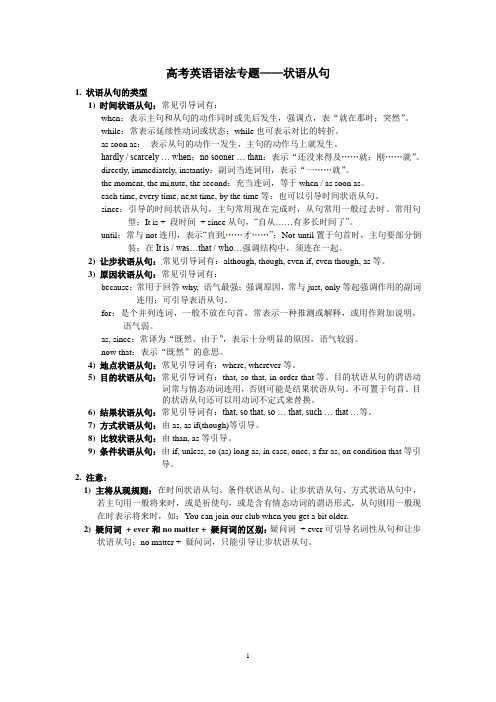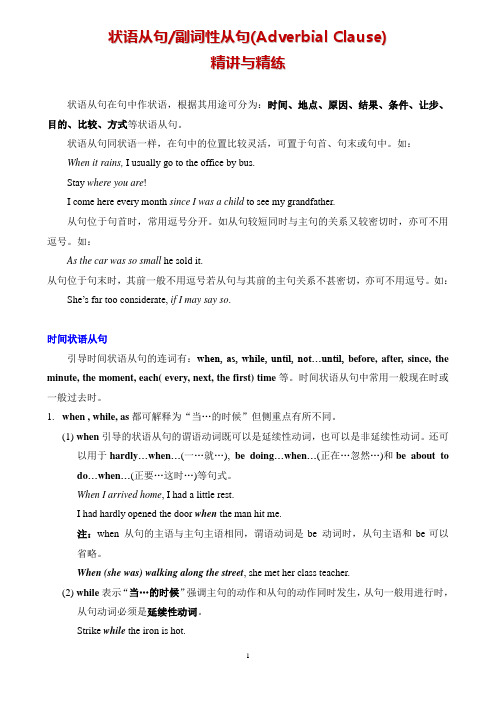o10状语从句
高三英语语法讲解状语从句

高二英语语法:状语从句讲解由从句担任的状语,在句子中可修饰谓语(或其他动词)、形容词、副词或是整个句子,它可以用来表示时间、地点、原因、目的、结果、条件、方式、比较、让步等。
状语从句是一较大的语法项目,也是近几年高考题中常见的一个重要试点。
高考中已考查了时间、让步、地点、条件、目的等状语从句,这些从句仍是今后高考热点,应作充分准备。
同时对方式状语从句也应引起重视。
一、时间状语从句表示时间的状语从句可由when, as, while, whenever, after, before, till (until), since, once, as soon as (或the moment ), by the time, no sooner ……than, hardly (scarcely)…… when, every time等引导。
e.g. When I came into the office, the teachers were having a meeting.He started as soon as he received the news.Once you see him, you will never forget him.No sooner had I gone to bed than I went to sleep.二、原因状语从句原因状语从句是表示原因或理由的,引导这类从句的最常用的连词是because,since, as , now that(既然)等,for 表示因果关系时(它引导的不是从句)为并列连词,语气不如because强。
e.g. He is disappointed because he didn't get the position.As it is raining, I will not go out.Now that you mention it, I do remember.三、地点状语从句引导地点状语从句的连词是where 和wherever等。
2019年高考英语热点题型和提分秘籍 专题10 状语从句(教学案) 含解析

状语从句则用来表示时间、地点、原因、条件、目的、结果等方面的关系。
单项填空题型中,该部分是必考内容。
并列连词在这个题型中重点考查and,but,or,so 等;状语从句的考查主要集中在条件状语从句、让步状语从句、时间状语从句、原因状语从句和结果状语从句等中。
解决并列句和状语从句的关键是找出句子之间或从句与主句之间的逻辑关系。
热点题型一时间状语从句例1、We need to get to the root of the problem ________ we can solve it.A.while B.afterC.before D.as答案:C【提分秘籍】1.when,while和as引导的时间状语从句When we handed him the bag of food,he lit up and thanked us with watery eyes.当我们递给他那包食物时,他对我们表示感谢,脸上露出喜色,眼睛也湿润了。
My only mistake was that I dropped some on the floor when/while I was packing them up.我的唯一过错是当我打包时掉在了地上一些。
One Friday,we were packing to leave for a weekend away when my daughter heard cries for help.一个周五,我们正在打包动身去过周末,就在这时我女儿听到了呼救声。
2.表示“一……就……”含义的词(短语)引导的时间状语从句(1)as soon as;immediately;directly;instantly;themoment/minute/instant;no sooner...than...;hardly...when...(2)hardly...when...;no sooner...than...中主句用过去完成时,从句应用一般过去时;当hardly和no sooner 位于句首时,主句要部分倒装。
《大学英语(2)》第四课FAQ 状语从句

《大学英语(2)》第四课FAQ状语从句Adverbial Clause状语从句(又称副词从句)在句子中起状语作用,修饰主句的动词、形容词、副词或整句。
状语从句由从属连词引导,位置灵活,可以放置句首(从句后需要用逗号与主句隔开)、句中(从句前后都用逗号)或者句尾(从句前不需要用逗号)。
状语从句可以分为以下几种类型。
1. 时间状语从句时间状语从句可以由下列连词引导:when,whenever,while,as,before,after,since,now that,until,once,the moment,immediately,no sooner...than,the second,instantly, hardly等。
例如:When my father came home yesterday, I was watching NBA games. 当父亲回家的时候,我在看NBA球赛。
When I was ten, I began to learn to play basketball. 我十岁的时候开始学习打篮球。
While he is listening to a song, he always sings along. 当他听歌的时候,他总是会随着一起唱。
You will grow taller as you grow older. 随着你长大,你也会长高。
以上4个句子中的状语从句均表示某一时刻或者某时间段。
注意:(1)当使用连接词when表示“……时候”时,它所引导的从句中谓语动词用一般现在时或者一般过去时,不能用完成时态。
(2)when,while和as都引导表示时间的状语从句,它们的区别在于动作发生的时间顺序。
用when时,从句的动作可以与主句的动作同时发生或先于主句的动作发生;用as时从句和主句的动作同时发生;用while时从句和主句的动作同时发生,也可表示持续一段时间。
例如:I didn't know my step-father before I was brought to this family. 在我被带到这个家庭之前,我不认识继父。
高考英语语法——_状语从句习题及讲解

高考英语语法专题——状语从句1. 状语从句的类型1) 时间状语从句:常见引导词有:when:表示主句和从句的动作同时或先后发生,强调点,表“就在那时;突然”。
while:常表示延续性动词或状态;while也可表示对比的转折。
as soon as:表示从句的动作一发生,主句的动作马上就发生。
hardly / scarcely … when;no sooner … than:表示“还没来得及……就;刚……就”。
directly, immediately, instantly:副词当连词用,表示“一……就”。
the moment, the minute, the second:充当连词,等于when / as soon as。
each time, every time, next time, by the time等:也可以引导时间状语从句。
since:引导的时间状语从句,主句常用现在完成时,从句常用一般过去时。
常用句型:It is + 段时间+ since从句,“自从……有多长时间了”。
until:常与not连用,表示“直到……才……”;Not until置于句首时,主句要部分倒装;在It is / was…that / who…强调结构中,须连在一起。
2) 让步状语从句:常见引导词有:although, though, even if, even though, as等。
3) 原因状语从句:常见引导词有:because:常用于回答why, 语气最强;强调原因,常与just, only等起强调作用的副词连用;可引导表语从句。
for:是个并列连词,一般不放在句首,常表示一种推测或解释,或用作附加说明,语气弱。
as, since:常译为“既然、由于”,表示十分明显的原因,语气较弱。
now that:表示“既然”的意思。
4) 地点状语从句:常见引导词有:where, wherever等。
5) 目的状语从句:常见引导词有:that, so that, in order that等。
状语从句精讲与精练

状语从句/副词性从句(A d v e r b i a l C l a u s e)精讲与精练状语从句在句中作状语,根据其用途可分为:时间、地点、原因、结果、条件、让步、目的、比较、方式等状语从句。
状语从句同状语一样,在句中的位置比较灵活,可置于句首、句末或句中。
如:When it rains, I usually go to the office by bus.Stay where you are!I come here every month since I was a child to see my grandfather.从句位于句首时,常用逗号分开。
如从句较短同时与主句的关系又较密切时,亦可不用逗号。
如:As the car was so small he sold it.从句位于句末时,其前一般不用逗号若从句与其前的主句关系不甚密切,亦可不用逗号。
如:She’s far too considerate, if I may say so.时间状语从句引导时间状语从句的连词有:when, as, while, until, not…until, before, after, since, the minute, the moment, each( every, next, the first) time等。
时间状语从句中常用一般现在时或一般过去时。
1.when , while, as都可解释为“当…的时候”但侧重点有所不同。
(1) when引导的状语从句的谓语动词既可以是延续性动词,也可以是非延续性动词。
还可以用于hardly…when…(一…就…), be doing…when…(正在…忽然…)和be about to do…when…(正要…这时…)等句式。
When I arrived home, I had a little rest.I had hardly opened the door when the man hit me.注:when 从句的主语与主句主语相同,谓语动词是be 动词时,从句主语和be可以省略。
条件状语从句,宾语从句

状语从句的考点讲解和训练【考点直击】1. 时间状语从句2. 条件状语从句3. 原因状语从句4. 结果状语从句5. 比较状语从句6. 目的状语从句7. 让步状语从句8. 地点状语从句【名师点睛】用来修饰主句中的动词,副词和形容词的从句叫状语从句。
根据其含义状语从句可分为时间状语从句,地点状语从句,条件状语从句,原因状语从句,结果状语从句,比较状语从句,目的状语从句,让步状语从句。
1. 时间状语从句(1)时间状语从句常用when, as, while, before, after, since, till, until, as soon as等连词来引导。
例如:It was raining hard when got to school yesterday.While he was doing his homework, the telephone rang.As he walked along the lake, he sang happily.He had learned a little Chinese before he came to China.After he finished middle school, he went to work in a factory.(2)在时间状语从句里,通常不用将来时态,用现在时态表示将来的动作或状态。
例如:I’ll ring you up as soon as I get to New York.I will tell him everything when he comes back.He won’t believe it until he sees it with his own eyes.(3)在带有till或until引导的时间状语从句的主从复合句里,如果主句用肯定式,其含义是“一直到……时”,谓语动词只能用延续性动词。
如果主句用否定式,其含义是“直到……才……”, “在……以前不……”, 谓语动词可用瞬间动词。
中考英语《状语从句》知识点总结

中考英语《状语从句》知识点总结导读:本文中考英语《状语从句》知识点总结,仅供参照,假如能帮助到您,欢迎评论和分享。
中考英语《状语从句》知识点总结状语从句指句子用作状语时,起副词作用的句子。
它能够修饰谓语、非谓语动词、定语、状语或整个句子。
依据其作用可分为时间、地址、原由、条件、目的、结果、退步、方式和比较等从句。
状语从句一般由连词 (附属连词 )指引,也能够由词组惹起。
从句位于句首或句中时往常用逗号与主句分开,位于句尾时能够不用逗号分开。
一、时间状语从句重点 : 时间状语从句,由以下连词指引:when while as after before as soon as since till /until by the time 在时间状语从句中,要注意时态一致。
一般状况下主句是未来时的时候,从句要用一般现在时。
1.when 当。
的时候Mozart started writing music when he was four years old.(当)莫扎特的时候,开始写音乐作品。
2.while 当。
时 He visited a lot of places while he was traveling. 他在旅途中观光了很多地方。
3.as 在。
的同时 ;一边。
一边。
He smiled as he stood up. 他一边站起来一边笑着。
4.after在。
以后He left the classroom after he hadfinished his homework the other day.头几日做完作业以后回的家。
5.before 在。
以前 Mr. brown had worked in a bank for ayear before he came here.布朗先生来这以前已经在一家银行里工作一年了。
6.as soon as一。
就。
We began to work as soon as wegot there.我们一到那就开始工作。
高考英语语法解析之状语从句

2022年高考英语语法讲解时间状语从句1、时间状语从句可由when,whenever,while,before,after,until,till,since,now that,once,as soon as等连词引起:Let’s wait until(till)the rain stops.等雨停了再说。
She comes to talk to me whenever she feels lonely.每当她感到寂寞时就来和我聊天。
As I talked,I gained some confidence.我一面谈着一面增强了信心。
Now that I have come back,I want to help you both.现在既然我回来了,我要帮助你们两人。
Once the train is moving,there is no way to stop it.一旦火车开动了就没法址它停下来。
2、由every time,the moment等词引起的从句也可以用作状语Every time I catch a cold,I have pain in my back每回伤风我的背就疼。
Stormy applause broke forth the moment she appeared on the stage她一在台上出现就响起暴风雨般的掌声。
He had impressed me that way the first time I met him.我第一次碰到他时,他就给我这个印象。
Be sure to call on us next time you come to town.下次进城你一定来找我们。
3、instantly,immediately,directly等词也可引起时间状语从句The machine will start instantly you press the button.你一按电钮机器就会开动。
- 1、下载文档前请自行甄别文档内容的完整性,平台不提供额外的编辑、内容补充、找答案等附加服务。
- 2、"仅部分预览"的文档,不可在线预览部分如存在完整性等问题,可反馈申请退款(可完整预览的文档不适用该条件!)。
- 3、如文档侵犯您的权益,请联系客服反馈,我们会尽快为您处理(人工客服工作时间:9:00-18:30)。
状语从句:状语从句在句中起状语作用,修饰主句中的谓语动词、形容词或副词。
在初中阶段我们主要学习了以下几种:①时间状语从句:常见引导词when(当……时),as(一边……一边,当……时),while,before,after,since,till(until),as soon as等。
②原因状语从句:常由because(因为),since(既然),as(由于)等连接词引导。
eg.He didn’t hear the knocking at the door because he was listening to the radio .③地点状语从句:常由where(在……地方),wherever(无论……在哪儿)等连接词引导。
如:I’ll go where work conditions are difficult . 我愿意到工作条件困难的地方去。
④条件状语从句:常由if(假如,如果),unless(除非)等连接词或连接词组引导。
如:If I go to the Great Wall tomorrow , would you like to come along ?⑤比较或方式状语从句:常由as…as(像…一样),than(比),the…the(越……就越),as(正如),as if(似乎,好象)等引导。
如:I know you better than she does . / The more you practice , the more knowledge you will get .⑥目的状语从句:常由so(使得),that(以便),so that(为了,使得),in order that(这样……就)等来引导。
She takes notes carefully in class so that she may use them when she reviews her lessons after class .⑦结果状语从句:常由so(结果),so that(结果),so…that(such…that)(如此……以致……)等连接词引导。
He finished his homework so well that his teacher praised him in class .⑧让步状语从句:常由though(although)(虽然……但……),even if(即使),however(不管怎样),whatever(无论什么),no matter how(who…)(不管多么……)(无论谁……)等连接词或连接词组引导。
He went to school , though he was ill . / No matter who asks her for help , she is ready to help .注意:(错)No matter what you say is of no use now. (对)___________ you say is of no use now.(错)Prisoners have to eat no matter what they’re given, (对)Prisoners have to eat __________ they’re given.一.完成下列句子。
1.Jim spends a lot of money on books______he is not rich.2.Kate fell into sleep ______she was listening to the music.3.----Is David at school today?----No. He is at home ______he has a bad cold.4.We won't have supper ______my mother comes back.5.Speak to him slowly ____ ______he may understand you better.6. ______ she doesn't come on Sunday, I'll go fishing by myself.7.It is four years ______I left that small village.8. ______the air moves, it is called wind.9.We will go to the park ______it doesn't rain tomorrow.10.______little boys did ______much work. 11.There are few new words in the passage_____I can't understand it.12.Go back ______you come from.13.He reached the station ______the train had left.14.----Do you have a swimming pool?----No, we don't. At least, not ______big ______yours.15.Give me your paper ______you have finished it.16.It is raining hard, ______we have to stay at home.17. ______you work harder, you'll never pass the final exam.18.Look after the children ______I am out.19.The village is ______far away ______I can't get there on foot.20.That is ______an interesting book ______I can't stop reading it.1. I won’t call you, ________ something unexpected happens. A. unless B. whether C. because D. while2. We all know that, __________ , the situation will get worse.A. not if dealt carefully withB. if not carefully dealt withC. if dealt not carefully withD. not if carefully dealt with3._______ he had not hurt his leg, John would have won the race. A. If B. Since C. Though D. When4. Pop music is such an important part of society ______ it has even influenced our language.A. asB. thatC. whichD. where5. Small sailboats can easily turn over in the water ______ they are not managed carefully.A. thoughB. beforeC. untilD. if7. The field research will take Joan and Paul about five months; it will be a long time _____ we meet them again.A. afterB. beforeC. sinceD. when8. Leave your key with a neighbor ___ you lock yourself out one day.A. ever sinceB. even ifC. soon afterD. in case9. Tim is in good shape physically ______ he doesn’t get much exercise. A. if B. even though C. unless D. as long as10. You will be successful in the interview you have confidence. A. before B. once C. until D. though11. ______ you may have, you should gather your courage to face the challenge.A. However a serious problemB. What a serious problemC. However serious a problemD. What serious a problem12. He was told that it would be at least three more months ________ he could recover and return to work.A. whenB. beforeC. sinceD. that13._____ there is a snowstorm or some other bad weather, the mail always comes on time. A.Because B.If C.When D.Unless14. _____ tomorrow, our ship will set sail for Macao.A.However the weather is like B.However is the weather like C.Whatever is the weather like D.Whatever the weather is like15. ______ our manager objects to Tom's joining the club, we shall accept him as a member. A. Until B. Unless C If D. After16. Many of them turned a deaf ear to his advice, _______ they knew it to be valuable.A. as ifB. now thatC. even thoughD. so that17. My parents live in a small village. They always keep candles in the house _____ there is a power out.A. ifB. unlessC. in caseD. so that18. We had to wait half an hour _____ we had already booked a table. A. since B. although C. until D. before19. --- Where’s that report? --- I brought it to you ______ you were in Mr. Black’s office yesterday.A. ifB. whenC. becauseD. before20. --- Have you got any idea for the summer vacation? --- I don’t mind where we go ______ there’s sun, sea and beach.A. as ifB. as long asC. now thatD. in order that21--- Do you have a minute? I’ve got something to tell you. --- Ok, ______ you make it short.A. now thatB. if onlyC. so long asD. every time22. Nancy enjoyed herself so much _____ she visited her friends in Sydney last year.A. thatB. whichC. whenD. where23. John thinks it won’t be long ______he is ready for his new job. A. when B. after C. before D. since24. He found it increasingly difficult to read, ______ his eyesight was beginning to fail. A. though B. for C. but D. so25. You’d better not leave the medicine ______ kids can get it. A. even if B. which C. where D. so that26. ______ hungry I am, I never seem to be able to finish off this loaf of bread.A. WhateverB. WheneverC. WhereverD. However27. I used to love that film ____ I was a child, but I don’t feel it that way any more. A. once B. when C. since D. although28. A small car is big enough for a family of three _____ you need more space for baggage.A. onceB. becauseC. ifD. unless29. There were some chairs left over _____ everyone had sat down. A. when B. until C. that D. where30. Don’t promise anything ______ you are one hundred percent sure. A. whether B. after C. how D. unless状语修饰动词、形容词、副词或整个句子。
